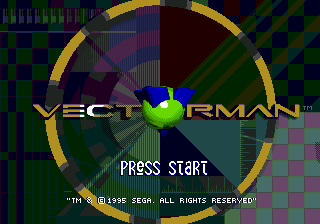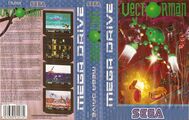Vectorman
From Sega Retro
| Vectorman |
|---|
| System(s): Sega Mega Drive |
| Publisher: Sega |
| Developer: BlueSky Software |
| Genre: Platformer |
|
CERO
Missing Parameter! |
Vectorman is a platform game developed by BlueSky Software and published by Sega for the Sega Mega Drive. It was released on October 24, 1995 in North America and on November 30, 1995 in Europe.
Vectorman was made partly in response to Nintendo/Rare's Donkey Kong Country, which contained pioneering graphics with pre-rendered 3D models as sprites. Donkey Kong Country's marketing stated that the game was impossible to do on Sega's Mega Drive, and Vectorman acts as one attempt to prove Nintendo wrong.
The game was first released in Japan on the PC compilation Sega Archives From USA Vol.1. The game is also a part of the Sega Mega Drive Collection for the PlayStation 2 and PlayStation Portable and is part of the Sonic Gems Collection for the Nintendo GameCube. It was released on the Wii Virtual Console on February 27, 2007 in Japan and April 5, 2007 in Europe, and in North America on September 22, 2008. Vectorman is part of Sega Mega Drive Ultimate Collection as well.
Contents
Story
In 2049, the human population of Earth embarks on a migratory voyage to try to colonize other planets. They leave mechanical "orbots" to clean up the mess they made on Earth through littering and pollution. Raster, a high-level orbot who watches Earth through a planetwide computer network, is accidentally attached to a working nuclear missile by a lesser orbot and goes insane, becoming an evil dictator named Warhead. He declares himself ruler of Earth, and begins preparing to execute any humans who dare return to their planet.
Enter Vectorman, a humble orbot in charge of cleaning up toxic sludge by simply discharging it into the sun. As he lands on Earth after his last trip, he finds chaos and confusion. Because all the other Orbots are controlled by Warhead (Vectorman having not been affected because he was away), Vectorman takes it upon himself to destroy the errant orbot and restore peace to Earth.
Graphics and Gameplay
Vectorman uses pre-rendered 3D models in its level and character designs. This gives the game a smooth, computer-generated feel. The original name of the villain, Warhead, was Raster (as in raster graphics, the opposite of vector graphics). Vectorman was considered the answer to Nintendo's Donkey Kong Country at the time, as they both used graphical tricks to look beyond what the console could do.
The game itself is a straightforward 2D action platformer. Vectorman is an orbot (something like a robot) powered with a ball gun in his hand; powerups include a machine gun, "bolo" gun, and triple-fire guns. ![]() and
and ![]() both shoot and
both shoot and ![]() jumps.
jumps. ![]() twice will launch Vectorman into a brief boost.
twice will launch Vectorman into a brief boost.
Vectorman possesses the ability to transform, through the use of powerups, into several different forms: including a drill, to cut through floors; a bomb, to destroy all surrounding enemies or breakable walls; and an aquatic form, useful for swimming underwater. In addition to powerup transformations, 3 levels host unique morphed forms with which to combat bosses in. Overall, the game consists of 16 levels.
Critical reaction
Vectorman was both a critical and commercial success, and was re-released in North America as part of the Mega Hit Series. It was acclaimed for its gameplay, level design and 3d graphics, and a great techno soundtrack.
Sequels
A sequel, Vectorman 2 was produced for the Sega Mega Drive, and was released in 1996.
Although BlueSky Software, the original developer of both Vectorman games closed in 2001, a Vectorman game for the PlayStation 2 was announced in 2003, but was soon cancelled. Initial reports criticized the game heavily for deviating from the Genesis titles by turning the game into a third-person shooter. It is believed that this criticism contributed to its cancellation. Vectormans redesign was also highly criticized as Vectorman looked very little like he did in the Mega Drive games.
Re-releases
Sonic Gems Collection has both Vectorman and its sequel as unlockable games. Vectorman can be unlocked by playing the compilation for at least 5 hours or by having a save file of Sonic Heroes or Sonic Mega Collection on the memory card. This was also the first time the game was released in Japan.
Sega Genesis Collection (Sega Mega Drive Collection in Europe) also features Vectorman and its sequel, this time as games available without the need for unlocking.
Production Credits
BlueSky Software
Designers: Richard Karpp, Mark Lorenzen
Project Manager: Jennifer Cleary
Game Concept By: Dana Christianson, Richard Karpp, Mark Lorenzen, Jason Weesner
Lead Background Artist: Amber Long
Background Artists: Jeff Jonas, Geoffrey Knobel, Mark Lorenzen, Jeff Remmer
Background Assistant: Brandon McDonald
Lead Animator: Marty Davis
Animators: Ellis Goodson, John Roy
Splash Screens: Jeff Remmer
Sound: Jon Holland
Music: Jon Holland
Lead Programmer: Richard Karpp
Programmers: Mark Botta, Keith Freiheit, Bonita Kane
Special Thanks: Patrick Brogan, Tom Carroll, John Fulbright, Jerry Huber, Matt McDonald, Chuck Osieja, Sam Powell, Rick Randolph, Rick Schmitz, Kim Walsh
Sega
Producer: Jerry Markota
Assistant Producer: Marianne Arotzarena
Product Manager: John Garner
Marketing Assistant: Johnathan Kully
Test Game Lead: John Amirkhan
Test Assistant Leads: Mike Borg, Abraham Navarro, Kim Rogers
Game Testers: Marc Dawson, Ty Johnson, Jeff B. Junio, Tony Lynch, Raul Orozco, Ilya Reeves, Don Tica
Special Thanks: E. Ettore Annunziata, Smuv Deyoung, Clint Dyer, Joe Miller, Scott Rohde, Chris Smith, Terry Tang
Physical Scans
| Sega Retro Average | ||||
|---|---|---|---|---|
|
| {{|L}} | N/A |
|---|---|
| Based on 0 reviews | |
| Mega Drive, US (Mega Hit) |
|---|
- No players field
- Old content rating field
- Use romtable template
- All games
- Old-style rating (consolesplus)
- Rating without source
- Old-style rating (egm)
- Old-style rating (megafun)
- Old-style rating (gamefan)
- Old-style rating (gameplayers)
- Old-style rating (playerone)
- Old-style rating (vgce)
- No ratings
- Mega Drive Games
- Mega Drive Action Games
- 1995 Mega Drive Games
- Sega Channel Games
- Virtual Console Games
- Vectorman



